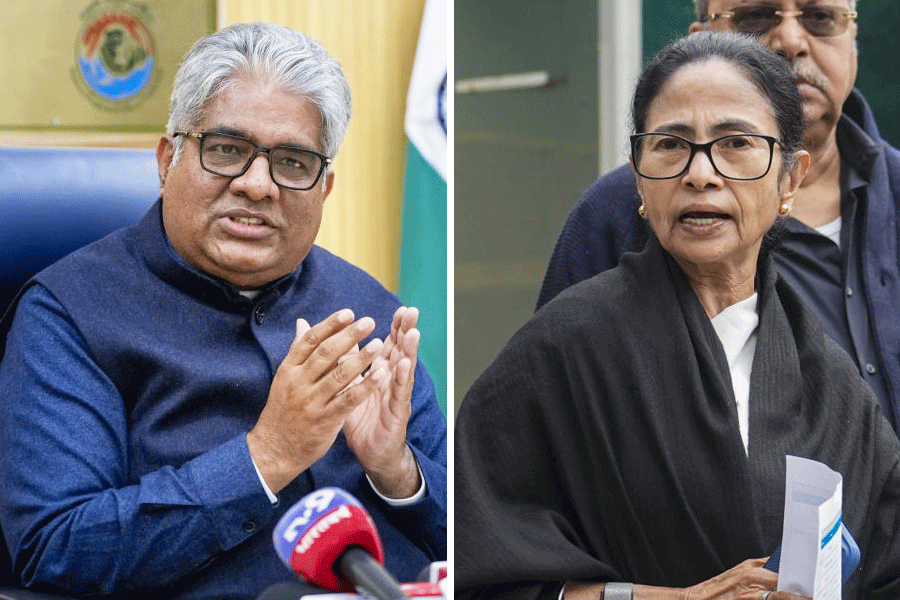Drop the cutlery
Sir — A video of an etiquette coach teaching students to eat a samosa with a knife and fork has understandably left many people amused. The demonstration, complete with instructions on how not to cut the samosa in the middle, feels like an elaborate prank rather than a lesson. The samosa was never meant to be dissected with surgical precision; its charm lies in the unapologetic crunch, the uneven dip in chutney, and the inevitable trail of crumbs from the plate to the mouth. The online outrage may be excessive, but if eating with one’s hands becomes a breach of etiquette, the next step might be sipping chai through a straw. The samosa, though, has endured worse fates and it will, no doubt, survive this latest attack of sophistication.
Arun Gupta,
Calcutta
Divided house
Sir — The filing of nomination papers for the Bihar assembly polls has revealed serious disunity within the INDIA bloc. The Rashtriya Janata Dal, the Congress, and other allies are contesting against one another in several constituencies. Such internal conflict weakens the Opposition and confuses voters who expected a united front against the ruling National Democratic Alliance. When alliances fail to coordinate even at the stage of nominations, their commitment to shared governance appears doubtful. The voters of Bihar deserve clarity, not overlapping ambitions disguised as cooperation. Political maturity is measured by coordination among allies.
Kiran Agarwal,
Calcutta
Sir — The Congress continues to display internal discord through its candidate selection. Several leaders who performed poorly in the previous election have been renominated in Bihar while promising candidates have been ignored. This signals poor political judgement and alienates grassroots workers. The leadership seems disconnected from local realities. Such decisions repeat the mistakes of 2020 when poor coordination within the Mahagathbandhan cost it victory. Bihar’s voters may interpret this as proof that the Congress values loyalty over performance.
Anupam Neogi,
Calcutta
Sir — The RJD’s list of candidates shows a preference for established faces, including individuals with criminal backgrounds and family legacies. Despite repeated criticism of ‘jungle raj’, the party appears comfortable embracing its old image rather than presenting a clean alternative. Dynastic politics continues to dominate, with spouses and children of former strongmen receiving tickets. This approach discourages new entrants and perpetuates the perception that politics in Bihar remains trapped in inherited power rather than public service.
Sreemoy Ghose,
Calcutta
Sir — The Jharkhand Mukti Morcha’s decision not to contest the Bihar elections is a telling sign of dysfunction within the INDIA bloc. Its accusation of a political conspiracy by the Congress and the RJD reveals how mistrust has replaced coordination among allies. Such behaviour undermines the purpose of forming a coalition. An alliance built on suspicion cannot inspire confidence among voters who expect integrity and mutual respect among partners. The INDIA bloc must resolve internal grievances before expecting public support.
T. Ramadas,
Chennai
Sir — The arrest of three INDIA bloc candidates shortly after filing their nominations raises questions about the quality of candidates being fielded. While some parties call the arrests politically motivated, the fact remains that candidates with pending cases continue to feature prominently in election lists. Political groups should focus on selecting individuals with integrity rather than those whose records invite controversy. Bihar’s progress depends on credible leadership. A recycling of tainted figures under different banners will keep Bihar mired in backwardness.
Noopur Barua,
Tezpur, Assam
Sir — The chaotic nomination process across parties in the INDIA bloc highlights a deeper issue in Bihar’s politics: a lack of coherence and accountability. INDIA appears fragmented and the ruling NDA has not offered a fresh vision. Both sides seem occupied with candidate calculations rather than policy clarity. Elections are meant to offer citizens meaningful choices, yet confusion and rebellion dominate the scene. Bihar deserves an election focused on governance.
Vinay Asawa,
Mumbai
Dormant asset
Sir — The argument for mobilising India’s vast household gold reserves is persuasive. Gold remains a dormant asset that could strengthen the economy if integrated into formal financial systems. Past schemes failed due to mistrust and poor outreach. Success now depends on credible infrastructure for testing purity, efficient logistics, and a digital interface that gives depositors transparency. If citizens see reliability and ease, they will participate. A trust-based, well-regulated monetisation programme could release significant capital without dependence on external borrowing.
Birkha Khadka Duvarseli,
Siliguri
Sir — The call for atmanirbharta in finance is timely. Global capital flows are uncertain and India’s growth cannot remain tied to foreign investment cycles. Domestic wealth, if channelled effectively, offers a stable and sovereign foundation for development. Gold monetisation represents one avenue but broader reforms are required. Pension funds, insurance pools, and household savings must be directed towards national infrastructure and manufacturing. Financial independence strengthens both economic stability and strategic autonomy. India must now match its industrial and technological confidence with fiscal self-belief. Each phase of India’s progress has come from turning necessity into innovation.
Niamul Hossain Mallick,
East Burdwan










